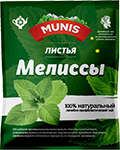Tea Munis «Melissa tea»
BASIC PROPERTIES
Melissa leaves are used as anti-inflammatory, antispasmodic, hypotensive and sedative for nervous disorders, cardiovascular diseases, women's diseases, biliary and renal colic, etc. Topical application for diseases of the oral cavity; joint and skin diseases.
DETAILED DESCRIPTION
Composition of Melissa tea:
Green tea, Melissa tea leaves.
Characteristic:
The healing properties of Melissa tea (lemon mint) are due to its rich chemical composition. The plant contains essential oil, tannins, ascorbic acid, bitterness, tannins, resins, flavonoids, saponins, a huge amount of organic acids. This list continues with such trace elements as calcium, magnesium, zinc, selenium, potassium, iron, manganese, copper, as well as vitamins C and B.
Useful properties of Melissa tea:
Melissa herb improves brain function, relieves headaches, and serves as an excellent diaphoretic and anti-inflammatory agent. In addition, it calms the nervous system and is a natural antidepressant. The plant has a diuretic effect, helps to remove excess fluid and reduce swelling.
Melissa helps with a number of problems in the gastrointestinal tract. It normalizes its functions, stimulates appetite, relieves spasms, helps in the fight against constipation and flatulence, enhances gastric motility, has a beneficial effect on stomach ulcers and improves digestion.
Melissa helps to put weight in order, softens the manifestations of toxicosis, normalizes the menstrual cycle and facilitates its flow. Lactating women often use lemon balm tinctures to increase breast milk production.
Melissa leaves are widely used as a good antiseptic and analgesic in the form of rinsing, lotions, compresses for inflammatory diseases and pain syndrome.
Scope of application:
Melissa leaves are recommended:
- for neurosis, depression, headache, dizziness, migraine;
- for arterial hypertension, atherosclerosis, tachycardia;
- for bronchial asthma;
- for biliary and renal colic;
- for the treatment of anemia;
- to increase immunity;
- with menopause, painful menstruation, toxicosis in pregnant women;
- to increase the amount of milk in lactating women;
- for the purpose of losing weight;
- for rinsing the mouth for herpes, gum disease and toothache;
- for compresses for gout, rheumatism, skin diseases;
- for lotions for bee and wasp stings;
- for the treatment of fungal diseases, dandruff, eczema, herpes zoster, acne.
 |
Release form: Method of preparation Recommendations for use: |
Expiry date:
According to the indicators.
Exceptions:
- hypotension;
- Individual intolerance.
Expiration date:
In a dry and cool place, within 2 years.
